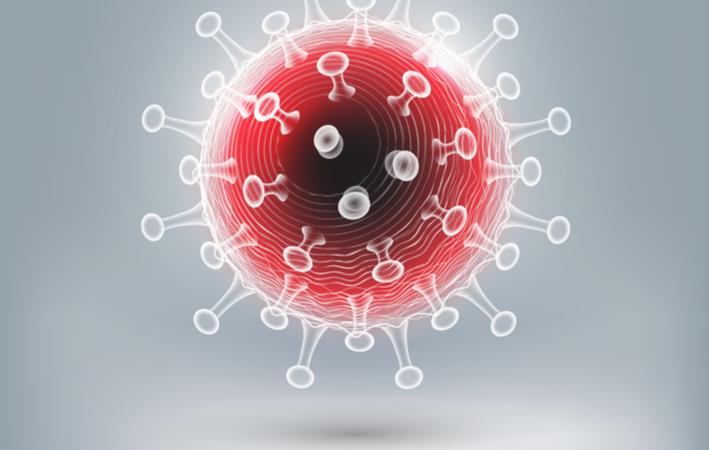French start-up Proneem, with the support of France Chimie and Novachim, has developed a textile treatment with high antiviral activity which neutralises the infectivity of SARS-CoV-2 on textile surfaces. The technology has been tested by an independent French laboratory and will be used to make gloves, masks and clothing capable of neutralising the virus.
Proneem, a company specialising in functional technologies applied to textiles in an industrial environment, combines sustainable virtues and advanced technologies to bring high added value to the textile industry (antibacterial, anti-mite and anti-insect properties). The company is at the forefront of innovation, led by Nathalie Hagege, who holds a doctorate in molecular biology and immunology. Its manufacturing processes based on microencapsulation and its major investments in R and D currently make it the only international company to hold a marketing authorisation for a biocidal treatment for functionalising textile articles intended for domestic use which come into contact with the skin.French start-up Proneem, with the support of France Chimie and Novachim, has developed a textile treatment with high antiviral activity which neutralises the infectivity of SARS-CoV-2 on textile surfaces. The technology has been tested by an independent French laboratory and will be used to make gloves, masks and clothing capable of neutralising the virus.#
In this pandemic period, the Proneem experts, supported by France Chimie and Novachim, put their expertise at the service of the fight against Covid-19 by developing the only French textile treatment with strong antiviral activity, whose effectiveness has been proven on SARS-CoV-2. Tested by an independent French laboratory, the technology forms a durable and permanent barrier which neutralises the infectivity of SARS-CoV-2 on textile surfaces.
This innovative treatment, Viralstop, combines the antiviral properties of zinc pyrithione and zinc oxide (ZnO) with other active ingredients, preventing the replication of many viruses such as coronaviruses and damaging the envelope viral. Tested on samples of different types of textiles, it is currently the only French treatment tested on the SARS-CoV-2 strain, which has been shown to be effective in neutralising the virus. Its virucidal action reduces the viral population by more than 99.99 per cent, increases the level of protection of textiles and limits the transmission of the virus. Infected surfaces represent a major vector of contamination and transmission, and the new coronavirus seems to survive for several hours to several days on textile surfaces.
“Proneem’s collaboration with Chimie France and Novachim allows innovation to progress more quickly and puts French R and D at the forefront. Indeed, for the first time in France, it was possible to carry out tests on the SARS-CoV-2 strain, proving the performance of a treated textile. With an effective active ingredient and documented textile impregnation systems, we have proven that it is possible to create textiles capable of destroying the virus,” explains Nathalie Hagege, founder and president of Proneem.
The researcher, member of the committee of experts who developed the AFNOR document on sanitary masks, is now working on the optimisation of all textile and non-textile materials (including nonwovens) to fight against all coronaviruses, including Covid-19, actively. The idea is to allow the manufacture of French anti-Covid-19 textile and non-textile equipment that are easy to use, reusable, at competitive prices and accessible to all, which would ensure maximum protection for the entire population while overcoming the risks of shortage of certain materials.
“Today, as we begin to emerge from the lockout, with a resumption of activity in different sectors of activity, it is essential to optimise the performance of sanitary and surgical masks with impregnation systems for maximum security. I am thinking of all industries, such as tourism or the event sector, which must be organised differently and relaunch their activities with preventive and security measures. And I’m also thinking of all the mothers who don’t send their children to school for fear of catching or transmitting Covid-19. With this innovation, my primary goal is to provide a solution to an unprecedented problem that is stopping the global economy. Wearing clothes capable of neutralising the virus would go a long way in overcoming the problem of social distancing,” adds Hagege.
Functionalised textiles with anti-Covid-19 properties will be used to make gloves, masks and clothing capable of neutralising the virus, which can therefore be used for long periods without fear of the infectivity of many viruses, including SARS-CoV-2. It is also possible to use Viralstop technology in many applications such as textile sprays with antiviral properties for the general public and the hotel sector (hotels, guesthouses, vacation rentals, campsites), antiviral textile cleaners for industrial laundries , hospital laundries, and dry cleaners.
Wearing clothes with anti-Covid-19 properties would significantly improve measures and issues of social distancing for tourism and the events sector, which are currently cancelled or postponed.
Fibre2Fashion News Desk (SV)


